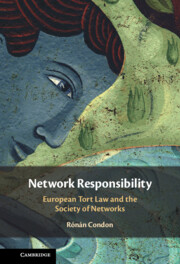2 - Tort Law and the Society of Organisations
Published online by Cambridge University Press: 14 July 2022
Summary
The second phase in tort law develop relates to its reception of the society of organisations, which represents an evolution in the law's knowledge base by which large public and private organisations become central to knowledge generation and management. This is accompanied by the rise of expertise and insurance, and a break between expert knowledge and distributed experience as the knowledge base of society. This is patterned onto the law by the rise in 'vertical vicarious liability' or organisational liability, whatsoever its doctrinal nomenclature at the turn of the twentieth century. Calculable risk replaces fault as a key legal concept in the attribution of acts and omissions, and tort law is increasingly conceptualised as concerned with risk management against a background of the providential state. However, the model of organisational liability that develops remains a model of responsibility and should be characterised as a form of weak corrective justice or organisational moral responsibility. These changes have a profound impact on the law, which is documented by reference public and private liability in French, UK and German law, but reach their limits with the rise of network governance.
Keywords
- Type
- Chapter
- Information
- Network ResponsibilityEuropean Tort Law and the Society of Networks, pp. 61 - 115Publisher: Cambridge University PressPrint publication year: 2022



